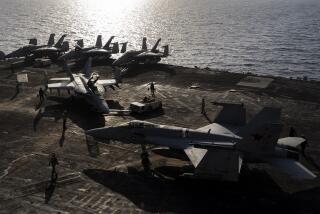U.S. Affirms Plan to Put Its Flag on Kuwait’s Ships
- Share via
WASHINGTON — The Reagan Administration said Tuesday that despite Iraq’s attack on the frigate Stark, “general agreement” has been reached to put American flags and captains on some Kuwaiti tankers in the Persian Gulf. But the policy came under criticism in Congress.
Senate Republican leader Bob Dole of Kansas called for “a special, renewed examination” of the idea of putting Kuwait’s ships under U.S.-flag protection.
“That plan may still make sense, but at the least, in light of Sunday’s tragedy, we need to take a new look,” Dole said.
The purpose of the plan is to give the United States legal authority to defend the Kuwaiti tankers with military force. The idea is that potential aggressors would be deterred knowing that American forces were prepared to respond.
Richard W. Murphy, assistant secretary of state for Mideast affairs, told the House panel that the agreement allowing Kuwait to register 11 of its 22 tankers in the United States will be finalized within weeks.
Sen. Jim Sasser (D-Tenn.) joined Dole in raising questions.
“If the Kuwaiti plan is, in fact, implemented, we will be sending our young people to within 50 miles of the war zone. And for what?” Sasser asked in a Senate speech. He said that only about 2% of the oil consumed by the United States passes through the gulf, compared to 90% of Japan’s oil and 50% of Western Europe’s supply.
No Help From Japan
“After all, whose oil are we protecting?” Sasser asked. “Do we see a single U.S. ally operating in the gulf? How much is Japan contributing to the protection of its Persian Gulf lifeline? The answer, of course, is nothing at all.”
Senate Majority Leader Robert C. Byrd of West Virginia said he approves of the related policy of providing naval escorts to Kuwaiti oil-carrying vessels in the gulf.
“I think that is a good policy on its face,” Byrd said. He did not discuss the plan to fly the American flag on Kuwaiti vessels.
White House spokesman Marlin Fitzwater told reporters traveling with President Reagan to Chattanooga, Tenn., for a high school commencement speech of the “general agreement” with the Persian Gulf country.
“We see no reason to change those plans at this point,” Fitzwater said.
More to Read
Sign up for Essential California
The most important California stories and recommendations in your inbox every morning.
You may occasionally receive promotional content from the Los Angeles Times.









